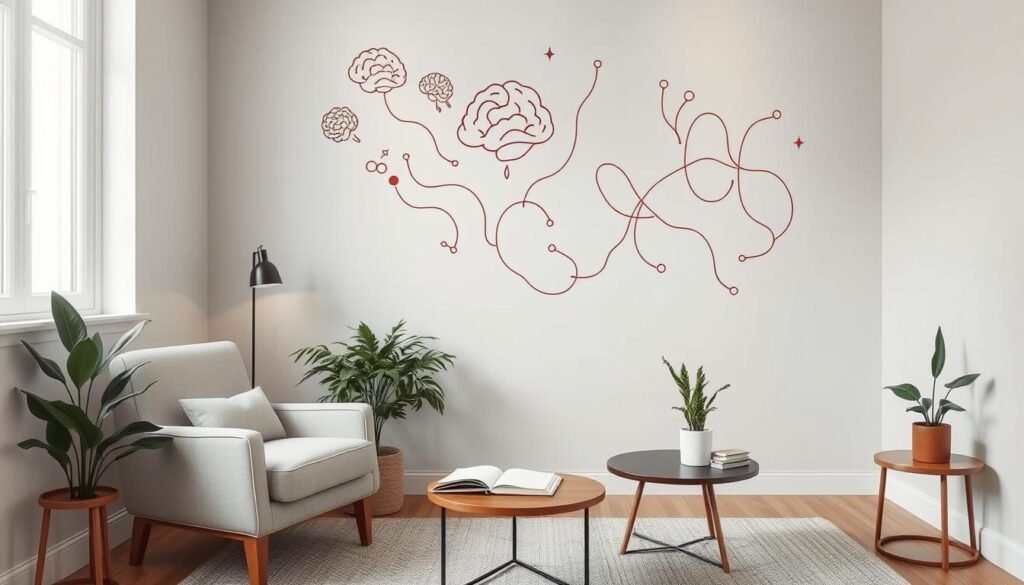Benzodiazepines are the top choice for anxiety medication in the US. However, they should be used with care because they can cause side effects and addiction. It’s important to treat anxiety with both medications for anxiety disorders and talking therapy for the best results.
Mental health experts, like the team at NYU Langone Health, prescribe various medications based on a person’s specific needs. You might get antidepressants, beta-blockers, or anxiolytics. Each type helps with different symptoms and treatment goals. Even though there might be side effects or a risk of dependency, the right treatment can greatly improve mental health.
Anxiety treatment isn’t the same for everyone. It’s just one part of a bigger plan for mental health care. To learn more about your options, including possible side effects and how to blend in natural remedies, click here: medications for anxiety disorders.
Key Takeaways
- Benzodiazepines are commonly prescribed for short-term anxiety relief.
- Antidepressants can take 4 to 6 weeks to show effectiveness in managing anxiety symptoms.
- Psychotherapy methods, such as cognitive-behavioral therapy, complement medication for better outcomes.
- Each medication class targets specific symptoms, emphasizing personalized treatment plans.
- Understanding the potential side effects of medication is crucial for managing expectations during treatment.
Understanding Anxiety Disorders
Anxiety disorders are common mental health issues, affecting nearly 1 in 5 American adults annually. They come in different types, each with its own symptoms. Knowing about disorders like generalized anxiety disorder, panic disorder, and social anxiety disorder helps in getting the right treatment.
Common Types of Anxiety Disorders
The variety of anxiety disorders is broad:
- Generalized Anxiety Disorder (GAD): Affects around 7 million American adults, with ongoing and excessive worry about life aspects.
- Panic Disorder: Seen in about 6 million Americans, it causes sudden panic attacks and symptoms like fast heart rate and sweating. It occurs twice as much in women.
- Social Anxiety Disorder: Known also as social phobia, around 15 million adults in the U.S. suffer from it. It equally affects men and women and brings intense fear in social situations.
Symptoms and Effects on Daily Life
It’s important to recognize anxiety symptoms for early treatment. They include psychological signs like restlessness and constant worry, and physical ones such as muscle tension and sleep problems. Anxiety greatly disrupts daily activities. It can harm relationships and how well people do at work.
Treating anxiety symptoms quickly can really help. For more help and information, click here.
How Medication Helps Manage Anxiety Symptoms
Medication gives people with anxiety different ways to deal with their issues. It’s important to know the difference between treatments that work quickly and those that work over time. For quick relief, doctors often prescribe benzodiazepines. These help right away. For a longer-term solution, antidepressants are used to gradually deal with the root causes. By using both methods, people with anxiety can feel better overall.
Short-term vs. Long-term Treatment Options
For immediate help, benzodiazepines are a common choice. They are among the most prescribed drugs worldwide and work fast. This makes them good for emergencies. But, they can have side effects like making you sleepy or dizzy. If used too much, they can lead to confusion and even addiction.
For ongoing care, SSRIs and SNRIs are often chosen. They help manage anxiety by slowly balancing brain chemistry. This leads to more stable emotions for those dealing with anxiety.
Combining Medication with Psychotherapy
Mixing medication with therapy is a smart move. Therapy, especially CBT, teaches valuable skills that make medication more effective. Studies show that people who do both get better results. This approach builds strength and improves emotional health over time.
Antidepressants: A Key Treatment Option
Antidepressants are key in treating anxiety disorders. Selective Serotonin Reuptake Inhibitors (SSRIs) and Serotonin-Norepinephrine Reuptake Inhibitors (SNRIs) are especially notable. They target serotonin in the brain, playing a big role in treating anxiety.
Selective Serotonin Reuptake Inhibitors (SSRIs)
SSRIs like sertraline and escitalopram are often chosen first for depression and anxiety. Studies show 40–60% of patients feel better within 6–8 weeks of starting. They boost serotonin, improving mood and reducing anxiety.
Serotonin-Norepinephrine Reuptake Inhibitors (SNRIs)
SNRIs, such as venlafaxine and duloxetine, target both serotonin and norepinephrine. This helps relieve anxiety symptoms more broadly. Doctors recommend them for various anxiety disorders. Symptoms often improve in the first weeks of use.
Despite potential side effects like nausea and insomnia, SSRIs and SNRIs are fundamental in treating anxiety. If anxiety doesn’t improve, other treatments may be considered. Yet, SSRIs and SNRIs are central to antidepressant therapy.
Benzodiazepines: Fast-acting Relief for Anxiety
Benzodiazepines are a key choice for fast relief from anxiety symptoms. They work by boosting the GABA receptor in the brain. This neurotransmitter helps calm the mind. Their rapid action is why many healthcare providers recommend them.
How Benzodiazepines Work
Benzodiazepines enhance GABA’s efficiency, leading to a calming effect on the brain. This brings swift comfort for those with Generalized Anxiety Disorder (GAD). GAD affects millions in the U.S. each year. Doctors often prescribe alprazolam (Xanax) or lorazepam (Ativan) for these cases. Yet, they’re usually for short-term use because of addiction risks.
Risks and Side Effects
The side effects of benzodiazepines include drowsiness and dizziness. More serious issues can arise, like addiction. Mixing them with alcohol is very risky. Long-term use raises dependency concerns. It’s vital to regularly check in with healthcare providers to manage these risks.
| Benzodiazepine | Indication | Common Side Effects |
|---|---|---|
| Alprazolam (Xanax) | Anxiety disorders, panic disorders | Drowsiness, dizziness, tolerance |
| Lorazepam (Ativan) | Anxiety disorders, convulsive status epilepticus | Drowsiness, dizziness, confusion |
| Clonazepam (Klonopin) | Panic disorder, seizures | Fatigue, dizziness, coordination issues |

Beta-Blockers: Managing Physical Symptoms of Anxiety
Beta-blockers are well-known for helping with anxiety management. They are great for dealing with the physical symptoms of anxiety. Even though they are mainly for heart failure, their use has grown. Now, many use them for things like fast heartbeats and shakiness when stressed.
Commonly Prescribed Beta-Blockers
Doctors often give out several beta-blockers for anxiety. Here are some examples:
| Beta-Blocker | Common Use |
|---|---|
| Metoprolol | Used for performance anxiety and stage fright. |
| Propranolol | Relieves physical symptoms in acute anxiety scenarios. |
| Atenolol | Helps reduce rapid heart rate and tremors associated with anxiety. |
How They Help in Specific Situations
Metoprolol and propranolol help with physical symptoms of anxiety during stressful times. For instance, public speaking. They block adrenaline, reducing sweating, shaking, and fast heart rates.
These meds don’t tackle the mind part of anxiety. But, they can make stressful situations easier to handle. Research shows they help a lot with performance anxiety. Check out more on this at Healthline.
Talking to a doctor is crucial before starting beta-blockers. They’re not suitable for everyone. Those with asthma or diabetes need to be very careful.
Atypical Antidepressants and Their Role
Atypical antidepressants are useful for treating anxiety disorders. They are good alternatives for those who don’t do well with usual treatments. Medicines like bupropion and mirtazapine work differently and have different side effects. This gives patients many choices for therapy.
Types of Atypical Antidepressants
Doctors use atypical antidepressants for major depression and anxiety disorders. Examples include:
- Bupropion: It increases dopamine and norepinephrine, helping with oversleeping and fatigue. It’s often used with other drugs to help with side effects like loss of libido.
- Mirtazapine: This drug boosts serotonin and norepinephrine, improving sleep. It has milder side effects, avoiding sexual problems.
- Trazodone: Effective for sleep issues, it also helps with PTSD nightmares.
- Vortioxetine: A newer drug that raises serotonin levels, it was approved in 2013 for depression.
Use in Treating Anxiety Disorders
Atypical antidepressants are good for people with anxiety and depression. Drugs like mirtazapine and bupropion can reduce anxiety and treat depression. They usually have fewer sexual side effects than standard treatments.
People should talk to doctors about using atypical antidepressants. It’s very important to watch for side effects, especially in younger people. For more info on treating anxiety with the right medicine, click this link.

Over-the-Counter Options: Antihistamines and More
Managing anxiety might not always require a doctor’s prescription. Over-the-counter (OTC) meds, especially antihistamines, are worth considering. These drugs are mostly known for fighting allergies. Yet, they can ease anxiety symptoms a bit too.
How Antihistamines Help Relieve Anxiety Symptoms
Antihistamines block certain brain receptors, which can make you feel calmer. Hydroxyzine is an antihistamine that the FDA approves for anxiety. Others, like Benadryl and Zyrtec, are also used sometimes. Though not as strong as prescription drugs, they help with mild anxiety.
Other Non-prescription Options for Managing Anxiety
Besides antihistamines, there are other ways to handle anxiety without a prescription. Some of these methods include:
- Exercise: Physical activities can greatly decrease anxiety.
- Mindfulness and meditation: These can help you relax and clear your mind.
- Herbal remedies: Chamomile and valerian root might have soothing effects.
Looking at all available options is essential for anyone dealing with anxiety. This includes OTC meds like hydroxyzine or other non-prescription methods. They can play a significant role in managing anxiety.
Psychotherapy and Cognitive-Behavioral Therapy (CBT)
Psychotherapy is key in handling anxiety, with cognitive-behavioral therapy (CBT) as a top method. CBT aims to change negative thinking and offer coping ways for anxiety. It needs patients to work closely, improving their problem-solving skills for future use.
The Importance of Therapy in Managing Anxiety
CBT is a leading choice for treating anxiety, known for its success. It usually involves weekly sessions over three to four months. Here, patients not only learn valuable techniques but get to practice them for better symptom control.
Methods like exposure therapy and cognitive restructuring are central to CBT. They especially help with panic by focusing on specific anxieties. This shows how CBT’s therapy is customized for each person’s needs.
Integrating Therapy with Medication
Using therapy with meds improves treatment for anxiety. It deals with both symptoms and root issues, taking a well-rounded approach. Research shows this combination can greatly enhance overall function and life quality.
Mixing CBT and medication prepares individuals to deal with their own challenges. It turns the attention to current struggles and shaping effective coping techniques.

| Therapeutic Technique | Description | Effectiveness |
|---|---|---|
| Cognitive Restructuring | Reinterpreting maladaptive thoughts | High for anxiety management |
| Exposure Therapy | Gradual exposure to feared situations | Well documented efficacy |
| Mindfulness Exercises | Techniques to combat worrying | Effective for generalized anxiety |
| Imaginal Exposure | Addressing catastrophic fears | Tailored for various disorders |
| Booster Sessions | Additional support post-treatment | Reinforces skills |
Lifestyle Changes to Support Medication
Making lifestyle changes can greatly help with anxiety management alongside medication. Developing healthy habits boosts our overall health and makes treatments more effective. Let’s explore some key actions to take.
Healthy Habits that Complement Medication Treatment
Starting regular exercise, eating a balanced diet, and getting enough sleep bring big benefits to mental health. These habits build a solid base for handling anxiety well. For instance, exercising can lower anxiety levels a lot.
Having a regular sleep schedule improves how we handle emotions. This makes medications work better.
Stress Reduction Techniques
Using stress reduction strategies is also key to managing anxiety. Techniques such as progressive muscle relaxation help in easing tension and anxiety. They have been proven effective in many studies.
Mindfulness-based cognitive therapy and visualization techniques are great for finding peace. These practices not only help relax but also strengthen personal control over anxiety.
- Progressive muscle relaxation for reducing tension.
- Meditation and mindfulness enhance emotional well-being.
- Engaging in deep breathing exercises lowers stress levels.
- Maintaining social connections fosters a supportive environment.
Conclusion
Handling anxiety needs a plan that includes many steps. This plan combines medicine, therapy, and changing daily habits. It’s built for each person. Knowing about different anxiety disorders helps people in their recovery. For example, 10.3% suffer from specific phobias and 2.7% from social anxiety disorder.
Medicines like antidepressants and benzodiazepines are important. But, almost one-third of people might face mild side effects. Following the doctor’s advice can also be hard. This is why doctors and patients must work together closely. They need to create plans that meet the person’s specific needs.
Such a detailed plan helps with current symptoms and improves mental health over time. With the right support, people can live better lives. They make progress in dealing with anxiety and in recovering for good.